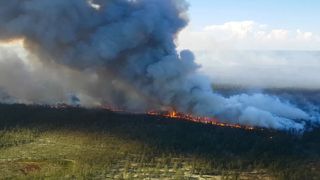UN confirms hottest temperature ever recorded in the Arctic
Temperatures hit 100 F in this Siberian town.

The highest temperature ever recorded in the Arctic has been officially confirmed by the United Nations' World Meteorological Organization (WMO), sounding ''alarm bells'' about climate change.
The temperature, a ''Mediterranean'' 100 degrees Fahrenheit (38 degrees Celsius) — which was recorded in the Siberian town of Verkhoyansk in June 2020 — was measured at the peak of an extended heat wave. In fact, temperatures across the region that summer averaged as much as 18 F (10 C) above normal, the WMO said in a statement.
''This new Arctic record is one of a series of observations reported to the WMO Archive of Weather and Climate Extremes that sound the alarm bells about our changing climate,'' Petteri Taalas, the WMO's secretary-general, said in the statement.
Related: Images of melt: See Earth's vanishing ice
The WMO said the extreme heat was "more befitting the Mediterranean than the Arctic" and that the heat wave was a key factor in ''fueling devastating fires, driving massive sea ice loss and playing a major role in 2020 being one of the three warmest years on record.''
According to data taken from the Russian Forestry Agency, Siberia's wildfires were the worst since records began this year, destroying an area of more than 46 million Acres (18.6 million hectares) of Russian forest in 2021 alone. The smoke from the enormous infernos even traveled as far as the North Pole.
Verkhoyansk is situated roughly 71 miles (115 kilometers) north of the Arctic Circle, and its meteorological station has been taking temperature readings since 1885. The unprecedented record has forced the organization to create a new category of extreme weather monitoring just for the Arctic Circle — the "highest recorded temperature at or north of 66.5⁰, the Arctic Circle."
Get the Space.com Newsletter
Breaking space news, the latest updates on rocket launches, skywatching events and more!
The Arctic is heating at a rate more than twice the global average, causing some extreme shifts in its climates and biomes. These include record numbers of ''zombie fires'' caused by the burning of carbon-rich peat, the breaking up of some of the Arctic's thickest ice, and the thawing of permafrost, which could release radioactive waste and awaken dormant viruses, Live Science previously reported.
Scientists have even warned that soaring Arctic temperatures could lead to the demise of the polar bear by the end of this century. Increased temperatures are also seeing the growth in numbers of a grizzly-polar bear hybrid called a "pizzly" bear.
According to the WMO, ''It is possible, indeed likely, that greater extremes will occur in the Arctic region in the future.''
The Arctic isn't the only part of the world that has experienced record-breaking temperatures. In 2020, Antarctica also hit a new temperature record, taken at Argentina's Esperanza Base, of 64.94 F (18.3 C) last year. And this year, Syracuse, Italy, registered a temperature of 119.8 F (48.8 C) — the highest recorded temperature in European history, Live Science reported.
California's Death Valley also experienced near-record-breaking heat this summer, when the mercury hit 130 F (54.4 C), Live Science reported at the time. This scorching temperature came close to tying the current record for the highest temperature ever recorded anywhere in the world: a searing 131 F (55 C), registered July 7, 1931, in Kebili, Tunisia.
Originally published on Live Science.
Join our Space Forums to keep talking space on the latest missions, night sky and more! And if you have a news tip, correction or comment, let us know at: community@space.com.

Ben Turner is a U.K. based staff writer at Live Science. He covers physics and astronomy, among other topics like weird animals and climate change. He graduated from University College London with a degree in particle physics before training as a journalist. When he's not writing, Ben enjoys reading literature, playing the guitar and embarrassing himself with chess.

